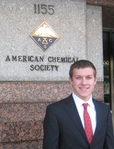
First of all, I am from a small town in New Jersey called Clinton. I have lived there for most of my life except for the first four years and the most recent four years while I have been at college. My mother is a math teacher and my father is a research chemist for ExxonMobil. Ever since I was a young boy, I have had a passion for learning new things and finding out how things work. My natural curiosity was fostered by my intellectual parents and visits to their workplaces. I attended ‘Bring-Your-Child-to-Work-Day’ at ExxonMobil for over ten years. I was
fascinated with the laboratories and experiments that affected millions of
peoples’ lives. Ever since I started learning chemistry from my father, I knew
that I wanted to be a chemist. Chemistry investigates how things work at the
smallest level and, if we can understand chemistry, we can do almost anything
imaginable.
Another thing I have recently discovered is that I enjoy teaching others the knowledge I have gathered. Teaching is not only a great way to spread knowledge, it is also a great learning tool for the teacher. I have come to realize that if I simply read something I am a lot less likely to remember it or understand it than if I try to teach it to somebody else. With this opportunity to attend a UN climate conference and this blog I will be sharing my knowledge with all of you and fortifying my knowledge on the subject and this subject is no small thing.
Climate change is real and affects everyone of us on the planet. I admit that at
first I was a bit skeptical about climate change like a lot of people. still are
today, both scientists and non-scientists alike, but then I was taught about the
actual data being collected. Now I am a believer and I understand the danger
climate change poses on our way of life. With this blog I hope to address both
audiences and convince the skeptics that climate change is real and something
must be done or our way of life as we know it is in serious jeopardy.
Anyway that’s enough preaching. Life goes on despite the impending problems and this blog will also cover the process of our journey to the other side of the world and wonder and spectacle that surrounds it. I encourage all of you to get more involved or at least start thinking about climate change. This blog will be a great communication tool and we are open to any feedback or ideas from our readers. We will be posting guest blogs if anyone is interested in voicing their opinion and I am very open to comments and emails. This journey represents a great opportunity in our lives where we will hopefully witness a major decision and a turning point in the war on climate change. And if not we will at least be more educated and have the opportunity to change the world.
 RSS Feed
RSS Feed